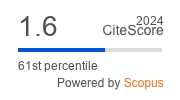Malaysian Journal of Mathematical Sciences, May 2022, Vol. 16, No. 2
Determination of Gaussian Integer Zeroes of $F(x,z)=2x^4-z^3$
Ismail, S., Atan, K. A. M., Sejas-Viscarra, D., and Eshkuvatov, Z.
Corresponding Email: shahrinaismail@usim.edu.my
Received date: 27 October 2020
Accepted date: 15 February 2022
Abstract:
In this paper the zeroes of the polynomial $F(x,z)=2x^4-z^3$ in Gaussian integers $\mathbb{Z}[i]$ are determined, a problem equivalent to finding the solutions of the Diophatine equation $x^4+y^4=z^3$ in $\mathbb{Z}[i]$, with a focus on the case $x=y$. We start by using an analytical method that examines the real and imaginary parts of the equation $F(x,z)=0$. This analysis sheds light on the general algebraic behavior of the polynomial $F(x,z)$ itself and its zeroes. This in turn allows us a deeper understanding of the different cases and conditions that give rise to trivial and non-trivial solutions to $F(x,z)=0$, and those that lead to inconsistencies. This paper concludes with a general formulation of the solutions to $F(x,z)=0$ in Gaussian integers. Results obtained in this work show the existence of infinitely many non-trivial zeroes for $F(x,z)=2x^4-z^3$ under the general form $x=(1+i)\eta^3$ and $c=-2\eta^4$ for $\eta\in\mathbb{Z}[i]$.
Keywords: Gaussian integer; Diophantine equation; prime power decomposition.









